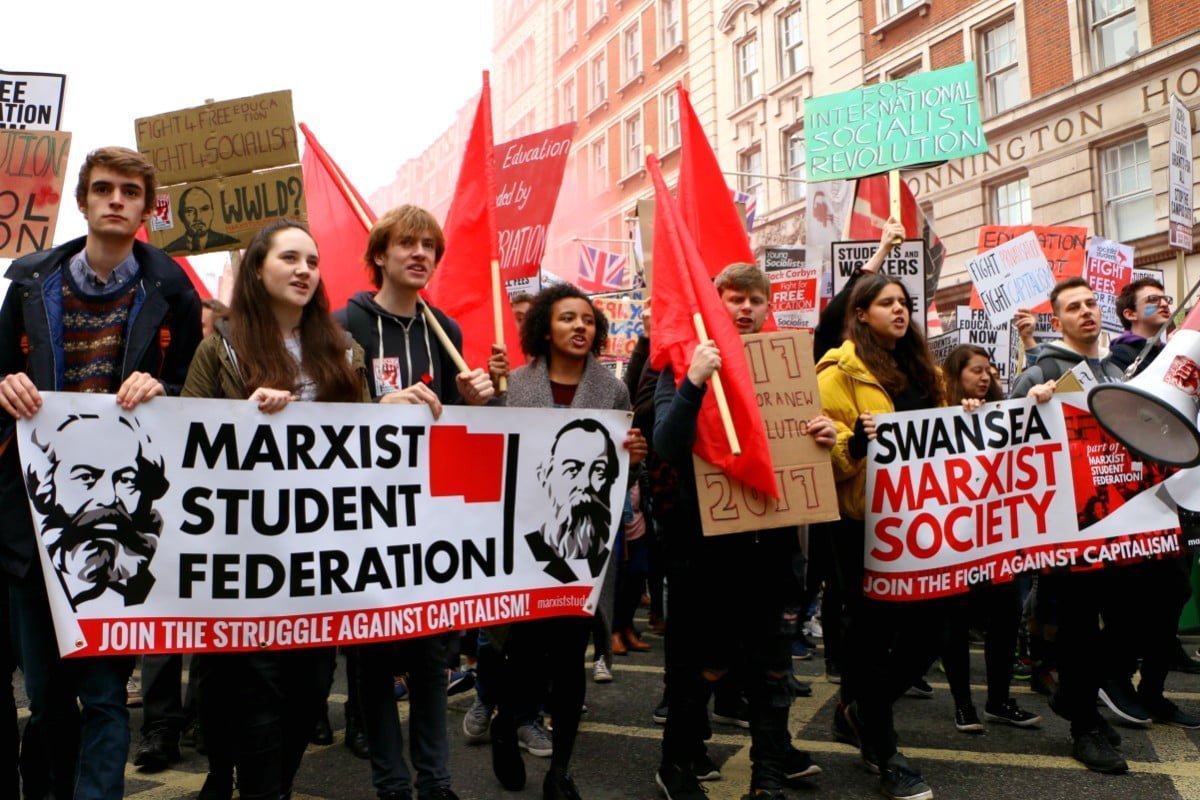Marxist Student delegates to this year’s NUS conference assess the outcomes from the debates, votes, and elections that have taken place over the past week. What is the way forward for the student movement from here?
The NUS conference has now closed for another year. This time it met during the most militant industrial action on university campuses in years, and while strike action is also taking place in FE colleges around the country.
The conference should have been a war council to discuss how the NUS could mobilise students to develop this struggle of our staff into a broader struggle involving all layers of the working class, to bring down the Tory government and the capitalist system.
That’s what Marxist students argued for this week: with our leaflets; the motions we submitted to the conference; the articles we’ve written; the content of our Revolution newspaper; and our fringe meeting on Nationalising the Monopolies. At this, both an NUS delegate and a UCU rep spoke, highlighting the need for student-worker solidarity.
Right-wing win
Unfortunately, with this view, we were in a small minority. The incumbent right-wingers at the conference won most of the elected positions. And they used a healthy dose of bureaucratic manoeuvres to ensure that more time was spent discussing plastic straws and a second Brexit referendum, than free education and solidarity with the UCU strikes.
The re-elected right-wing president of the NUS, Shakira Martin, closed the conference with a speech in which she said she would “welcome the Tories”. She stated that some of the politics at the conference made her “scared for the student who might be a little bit right-wing”. Unsurprisingly, this speech sparked a walk-out by huge numbers of conference delegates and a spontaneous demonstration with chants of “Shakira, Shakira, Shakira: Out, Out, Out”.
But beyond walkouts, the more left-leaning students at the conference weren’t really able to challenge the right because they lack clear ideas around which to campaign (see next article). Just one single left candidate said the word “socialism” in a speech. In fact,many of the ‘left’ speeches on motions and for elections were indistinguishable from those of right-wingers.
Unless the left mobilises the mass of students around clear revolutionary socialist ideas, it won’t make much headway at the NUS.
Frustration
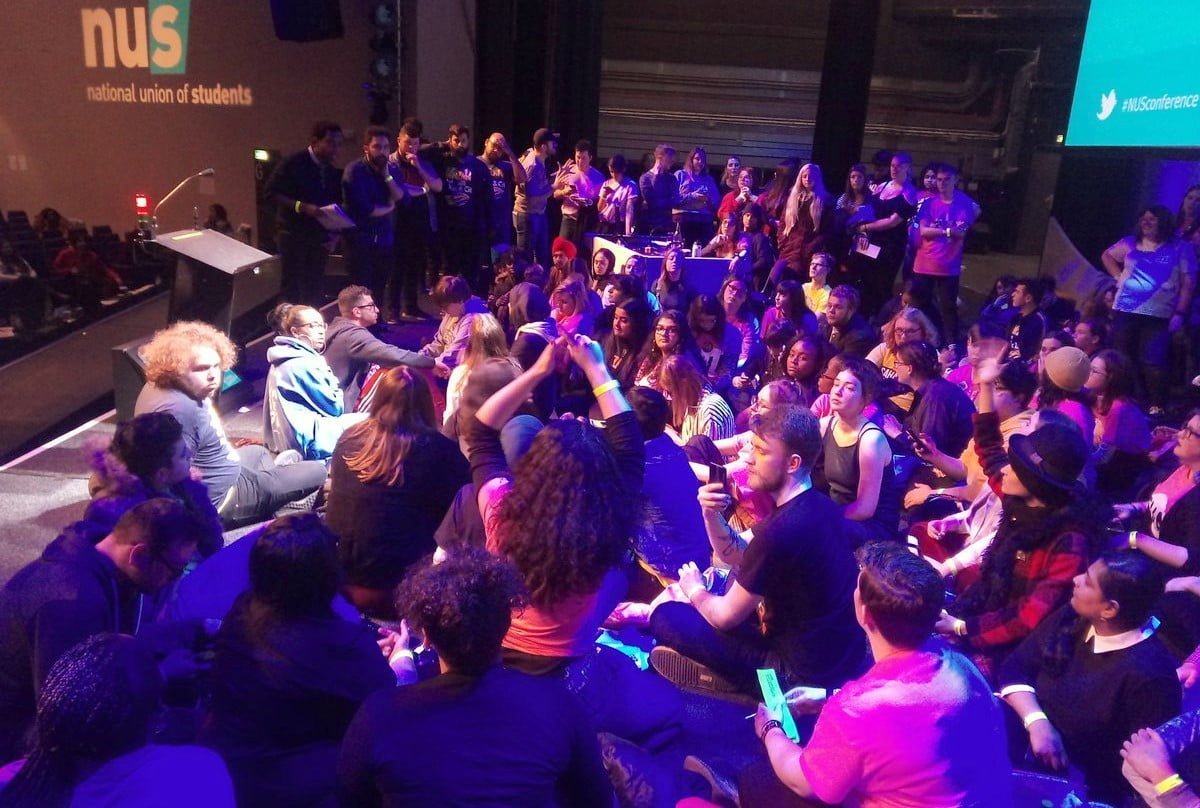 Frustration at the defeats being suffered by the left boiled over into a spontaneous occupation of the conference stage on the second day of the conference, which shut down the conference for three hours.
Frustration at the defeats being suffered by the left boiled over into a spontaneous occupation of the conference stage on the second day of the conference, which shut down the conference for three hours.
The frustration is understandable, but can only be avoided by organising properly in advance of the conference on the basis of clear socialist ideas, so that the defeats can be avoided. Substituting stunts for serious politics is not a good way to win the NUS to a radical socialist programme.
The lesson we need to take on board going forward is that a a serious clarification of ideas is necessary for left-wingers if we’re going to mobilise students to support our candidates and our ideas in the run-up to and at NUS conference. It’s not just a question of being better organised – it’s a question of having better political ideas.
We need to say clearly that we are revolutionary socialists who want to fight for free education by fighting against capitalism. We want to unite students and workers to bring down the government and put universities and colleges under the democratic control of staff and students, as part of a broader plan to nationalise the monopolies and plan the whole economy for need, not profit.
Join the Marxists! Fight for revolution!
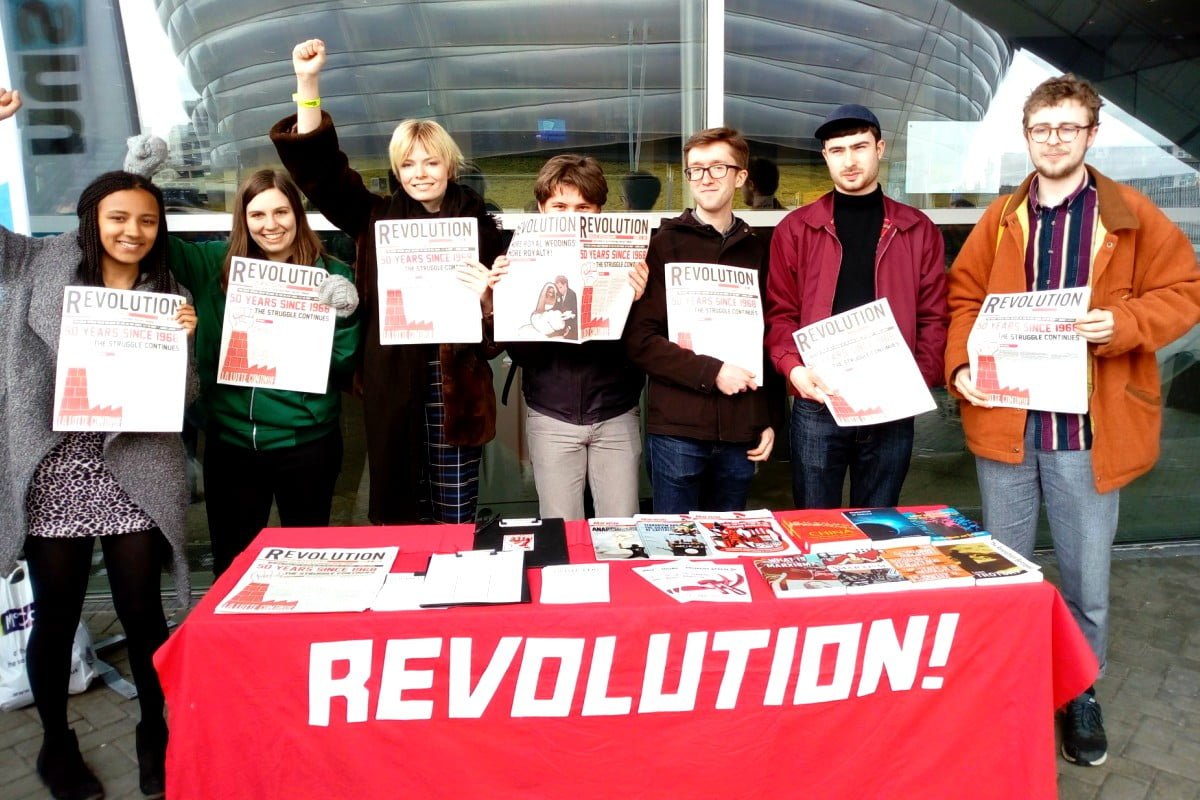 These ideas are the ideas of Marxism. Marxist students study these ideas week in and week out on campuses all over the country so that we’re able to argue convincingly for them in our student unions, at the NUS, in trade unions, and everywhere else.
These ideas are the ideas of Marxism. Marxist students study these ideas week in and week out on campuses all over the country so that we’re able to argue convincingly for them in our student unions, at the NUS, in trade unions, and everywhere else.
We were in a small minority at this conference. But we’re building up our forces. And we’re certain that it’s only our ideas that can fundamentally transform the NUS into an organisation that can tackle the problems faced by students on a day-to-day basis.
If you want to help us to turn the NUS into a fighting organisation that unites students and workers to struggle for a fundamental socialist transformation of society, then get in touch and join us!
By Marxist Student NUS delegates: Matt Rider (Swansea NUS delegate), Elia Martins (UCL NUS delegate), Sam Tollitt (UCL NUS delegate), and Fiona Lali (SOAS NUS delegate)
Why did the Left fail to win the presidency?
By Marxist Student NUS delegates
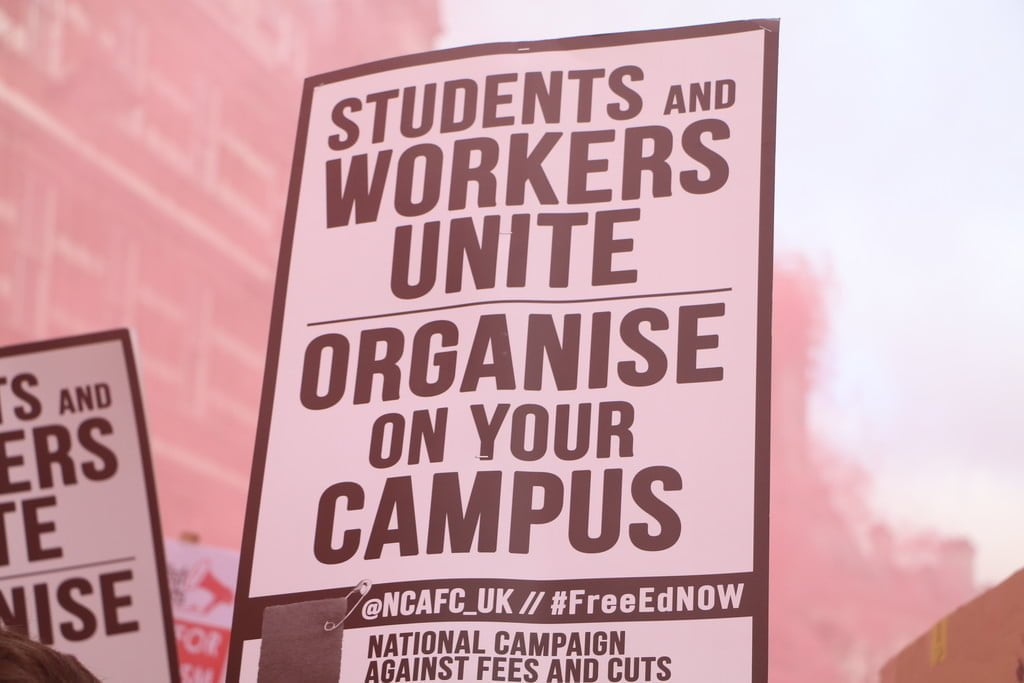 The challenge mounted this year by the student left for the position of NUS president failed. The attempt, had it been successful, would have taken control of the NUS out of the hands of right-wingers, who are intent on ensuring the NUS remains apolitical and disconnected from students. It would have put the NUS under the control of Corbyn-supporting activists – and that could only have been a good thing.
The challenge mounted this year by the student left for the position of NUS president failed. The attempt, had it been successful, would have taken control of the NUS out of the hands of right-wingers, who are intent on ensuring the NUS remains apolitical and disconnected from students. It would have put the NUS under the control of Corbyn-supporting activists – and that could only have been a good thing.
To answer the question of why the left failed to win the presidency of the NUS, we need to understand the broader context in which this vote took place. Ten years after the economic collapse of 2008, living and working conditions for the vast majority of people continue to deteriorate. There is no end in sight for the crisis of capitalism sparked by that collapse. And as long as the capitalist system persists, it will be working class people, and young people in particular, who are forced to pay for that crisis.
This situation has produced political polarisation all over the world, with more and more people looking for radical solutions to their problems. In Britain we’ve seen this polarisation to the left in the form of the Corbyn phenomenon.
At the NUS conference in 2016 this polarisation reached the top of the NUS, with the election of left-wingers to the leadership of the union. But the opportunity that this presented, to put forward radical socialist politics – which could solve the problems faced by students and young people – was wasted. Those NUS leaders spent more time bickering in the backrooms than organising the mass of students around radical left-wing ideas. As a result, the NUS conference in 2017 kicked them out and voted in a right-wing leadership team.
Serious problems require serious people
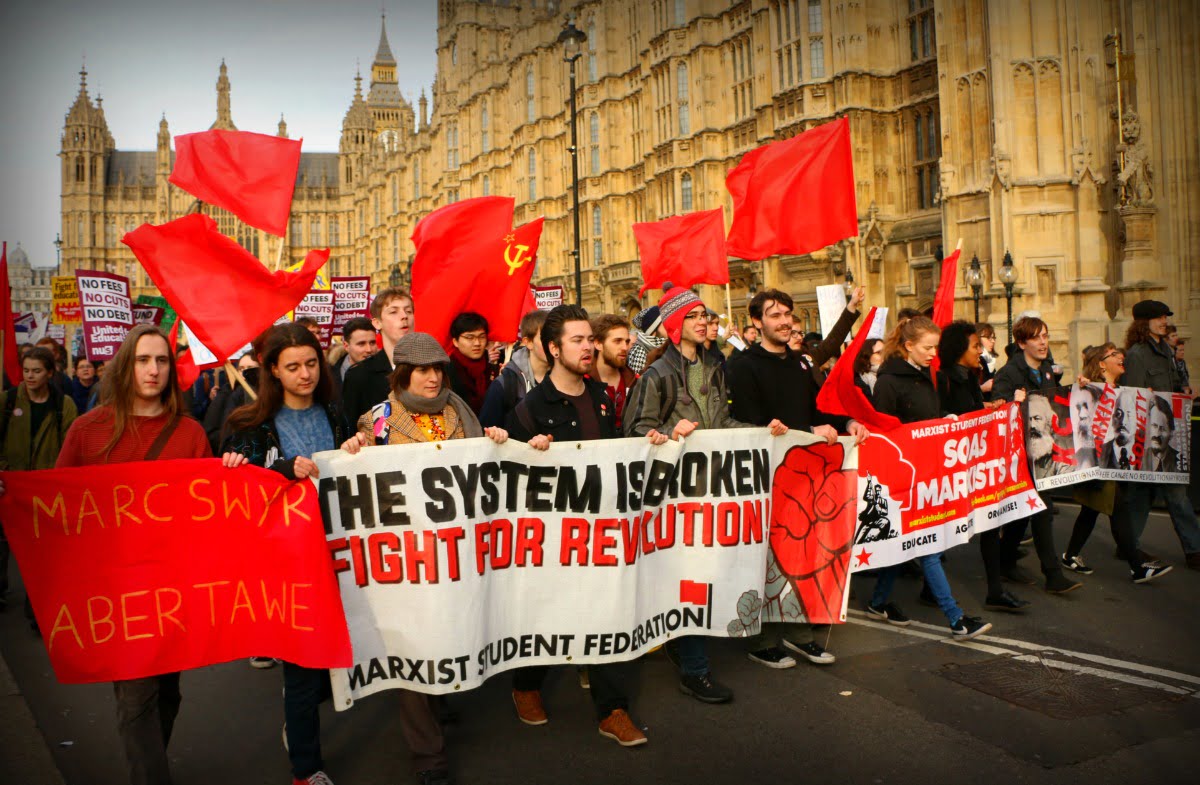 This year, the student left should have learned the lessons from 2016 and understood that a victory for the left can only be guaranteed by clear socialist ideas that can take the NUS and the student movement forward. Being loosely ‘left-wing’ and a bit of a campus activist isn’t enough.
This year, the student left should have learned the lessons from 2016 and understood that a victory for the left can only be guaranteed by clear socialist ideas that can take the NUS and the student movement forward. Being loosely ‘left-wing’ and a bit of a campus activist isn’t enough.
Without clarity of ideas and a bold, coherent programme, the student left won’t be able to solve the problems faced by students and young people. It’s not surprising that people don’t vote for the left if the left doesn’t present clear and serious ideas about how they plan to fight for students.
Unfortunately, this lesson does not seem to have been taken on board sufficiently. For example, some of the left-wing students at the NUS conference have described themselves merely as “campus troublemakers”, whose leaflet bears the headline: “Socialism: saving you from boring debates”.
One campaigner at the conference has been exhorting delegates to take leaflets for one of the left candidates, without reference to her politics, but rather on the grounds that “they’re the best designed leaflets at the conference!”
The overall impression created is that these are not serious people. For students sinking deeper and deeper into debt, who can’t afford their rent, and who will graduate into zero-hours contract jobs, these “troublemakers” don’t seem like they’d have any idea about how to fight for students’ interests. If we want people to take socialism seriously, then surely the starting point has to be that we take it seriously ourselves?
The need for clear ideas
The Left candidate for NUS President made a number of good promises in her manifesto, including spreading rent strikes, building unity between workers and students, and fighting for free education. These are struggles that should be pursued vigorously within the student movement.
But beyond these promises, there weren’t really many clear ideas about how to carry on these struggles, and how to make them successful. To mobilise large numbers of students for a rent strike, for example, it requires a clear political explanation that rent is high due to the marketisation of universities and the profit-seeking of landlords.
From this we can understand that a rent strike is not a solution in and of itself, but part of a broader strategy to bring down a Tory government that promotes marketisation and landlordism; to fight for the nationalisation of the land and the construction companies to provide cheap and good quality housing; and ultimately to overthrow a capitalist economic system that makes profiteering inevitable.
Without this clarity of political ideas, it won’t be possible to lead a rent strike to a victorious conclusion – that is, a conclusion that will actually solve the problem of extortionate rent once and for all. We need to put this kind of explanation forward consistently and coherently if we want left candidates to be taken seriously.
For free education – but how?
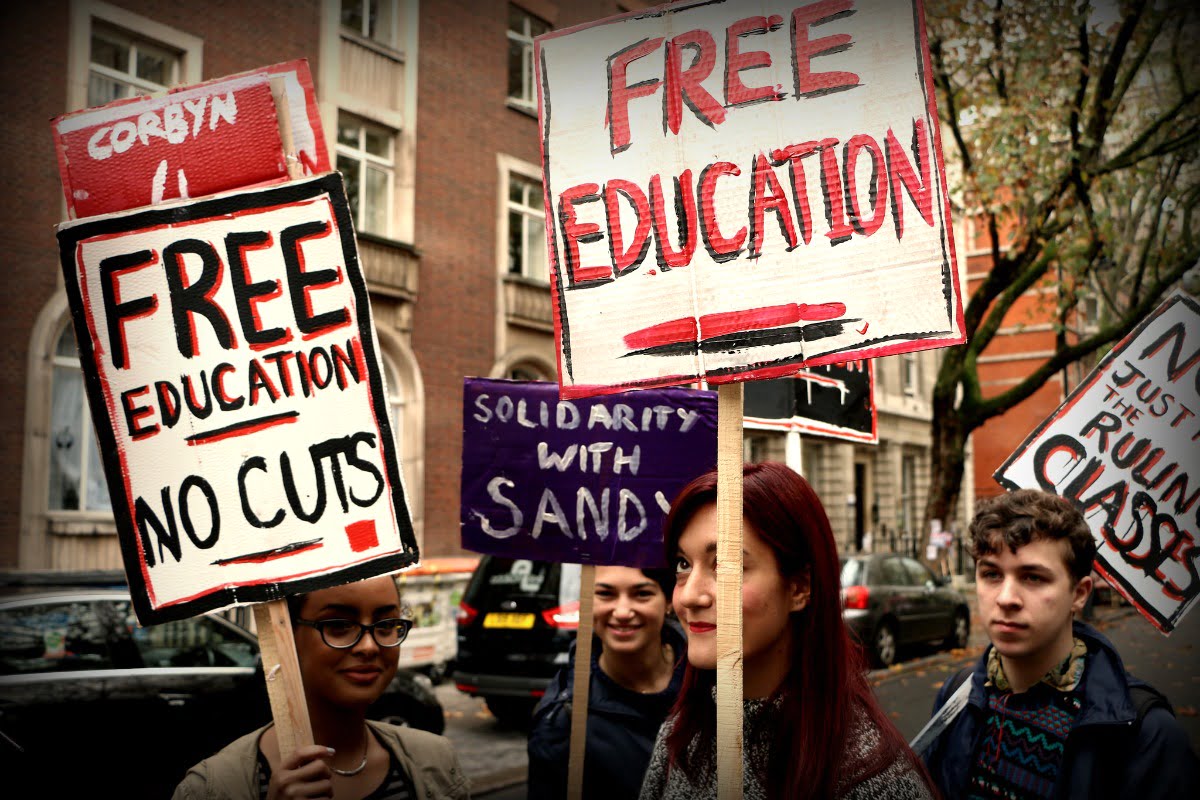 Free education is something that has been consistently defended over the last few years by left-wing students. But the proposed strategy for achieving free education is not always consistently convincing. At every demonstration for free education over the last few years, the dominant demand has been to “tax the rich to fund free education”.
Free education is something that has been consistently defended over the last few years by left-wing students. But the proposed strategy for achieving free education is not always consistently convincing. At every demonstration for free education over the last few years, the dominant demand has been to “tax the rich to fund free education”.
The problem is that the rich know how to avoid tax. If we want to make the rich pay for free education, we have to expropriate their businesses and put them under workers control as part of a democratic plan of production for all of society. Happily, one leaflet (other than the Marxist Student leaflets!) being handed out at the NUS conference this year made the suggestion that “nationalising the banks” might be a good idea. But this demand is included in the same sentence as a repetition of the demand to “tax the rich”!
This creates an impression of extreme confusion. Are we in favour of taxing the rich or nationalising the banks? One is a mild reform that makes no fundamental change to the capitalist system; the other would strike a fundamental blow against the institution of private property.
The implications of each demand are very different. And if we’re serious about striking blows against the foundations of the capitalist system by nationalising the banks, then we need to be ideologically and organisationally prepared for that struggle. Throwing around contradictory slogans isn’t a serious approach to politics – clarity and consistency is the prior condition for winning people to radical ideas.
Solidarity with strikes
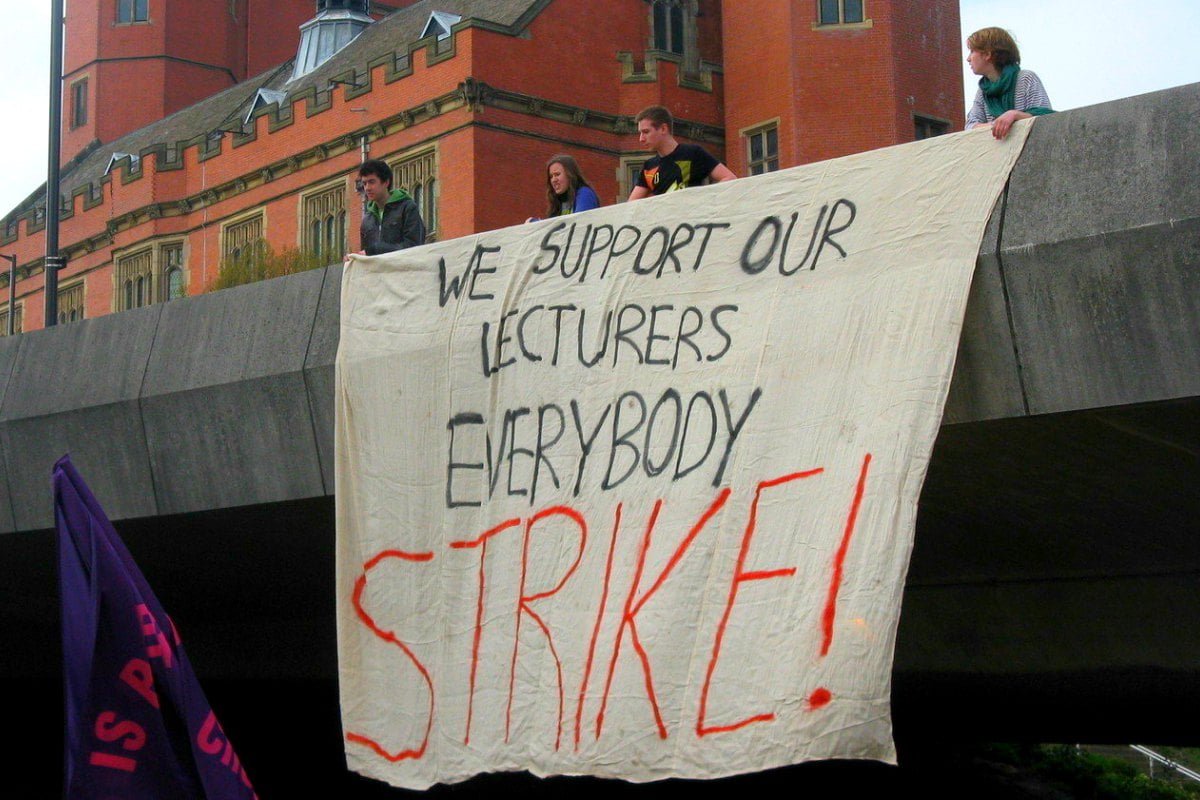 This point is particularly important in relation to the UCU strikes. The student left has rightly condemned the NUS leadership for taking almost no interest in the most militant industrial action seen on university campuses in many years.
This point is particularly important in relation to the UCU strikes. The student left has rightly condemned the NUS leadership for taking almost no interest in the most militant industrial action seen on university campuses in many years.
But the approach of some on the left to the strikes has been extremely confused to say the least. One leaflet being handed out at the NUS conference features a ‘For and Against’ debate between two members of the same left-wing group over the question of tuition fee refunds for teaching time lost during the strike.
This is astonishing because the demand for fee refunds incontrovertibly erodes student/worker solidarity and fully buys into the marketisation of education.
The student arguing for tuition fee refunds writes that “while solidarity ideally should be automatic, the reality is that it cannot be expected of students…”. This reads like the argument of a Tory student.
It’s no wonder that the left can’t put forward coherent and serious arguments for socialist policies if it can’t make up its mind over whether we can expect student/worker solidarity or not.
In general it’s never a good approach to focus on organisational questions, at the expense of political ones.
For example, many activists at the NUS conference this year have talked about how incredible the recent wave of university occupations has been and how this marks a fundamental shift in the student movement, akin to the wave of student occupations in 2010.
What is ignored is that the vast majority of these occupations were lacking in clear and serious political ideas. The Cambridge occupation, for example, focused more on the question of divestment from fossil fuels than it did on solidarity with the UCU. Meanwhile, the Reading occupation issued statements which included such devastating political analysis as “the university is a fuck”.
The consequence of this was that these occupations remained disconnected from the vast majority of the student population, involving just a small handful of the usual activists who had no real perspective of using the occupations as part of a broader strategy to bring down the government and fight marketisation and capitalism.
We are right to demand that the NUS support these occupations – but this support doesn’t mean uncritical cheerleading of activism for its own sake. Real support means giving political direction and leadership to the student movement, and linking it to a broader struggle for fundamental change in society.
Learn the lessons
The defeat of the left at this year’s NUS conference is disappointing. And this time the student left can’t afford to ignore the lessons.
The fact is that organisational questions and political ones go hand-in-hand. The way to build support for any campaign or candidate is with clear, coherent and radical political ideas.
People are drawing radical and even revolutionary conclusions about how society needs to be fundamentally changed. But they are not stupid and will be able to see through fudged ideas or campaigns that mash together lots of contradictory ideas and try to pass them off as something worth mobilising for.
This is the lesson we need to learn from the defeat of the left at this year’s NUS conference. Ideological clarity is the prerequisite for a successful campaign, and it’s the ideas of Marxism that are the only ones which can offer a way out for students, young people, and the working class.
How can we fight for free education?
By Elia Martins, UCL NUS delegate
 With 7 million students behind it, the National Union of Students (NUS) potentially has enormous power to fight for fundamental change in society. But unfortunately, at the moment, it defines itself simply as “the national voice of students helping them to campaign, get cheap student discounts and provide advice on living student life to the full”.
With 7 million students behind it, the National Union of Students (NUS) potentially has enormous power to fight for fundamental change in society. But unfortunately, at the moment, it defines itself simply as “the national voice of students helping them to campaign, get cheap student discounts and provide advice on living student life to the full”.
The NUS has the power to carry out bold policies that go way beyond battling for “cheap student discounts” and providing “advice to living student life to the full”. The NUS has an immense fighting potential to make a real change in universities and beyond. But to do so, it has be part of a wider struggle for political power.
The NUS needs to defend young and working class people against the ongoing austerity that has been detrimental to our mental health, employment and living standards.
This austerity is a product of a capitalist system in crisis. If you accept capitalism, in any form, then you must accept austerity, which is its logical conclusion.
The NUS must thus fight the problem at its roots by fighting against capitalism. This involves fighting on the basis of a clear and bold socialist programme, which aims at building strong links between students and staff. The NUS should link up with the Labour Party and other trade unions to kick out the Tories, institute socialist policies, and fight for a fundamental transformation of society.
Education should be free
Education is a vital investment in society. Society as a whole benefits from having an educated population. The quality and quantity of education available to the public has always been a general measure of social progress. If everyone has access to the wealth of knowledge, then everyone has the potential to contribute to developing society in a positive way. Marxists stand for free education because students’ future contribution to society far outweighs the costs of education.
In recent years, there have been a number of attacks and cuts in the higher education sector. We are for the maximisation of educational opportunities for everyone, and are opposed to cuts and closures to university courses, further education colleges and school teaching staff. Education should be free and accessible for everyone, throughout their lives. The NUS must launch a fight to abolish all cuts, tuition fees and corresponding debts.
Fund education through expropriation
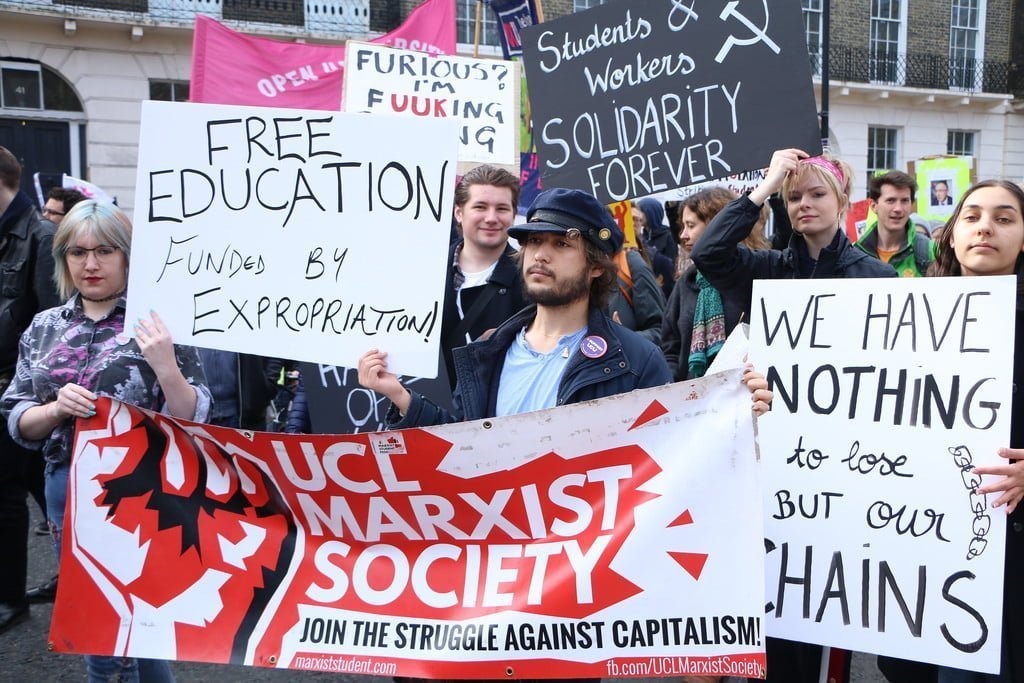 As a society, we have the resources to achieve free education for all. The banks, the biggest businesses, and the wealthiest individuals have enormous cash reserves and private ownership over the entire economy.
As a society, we have the resources to achieve free education for all. The banks, the biggest businesses, and the wealthiest individuals have enormous cash reserves and private ownership over the entire economy.
We demand that the rich pay to give young people a future. The NUS must demand free education and fund it through expropriating the 1%. As Marx puts it: “expropriate the expropriators”.
Similarly, to bring down living costs for students, the rip-off landlords should be expropriated and construction companies taken into public ownership so that good, cheap housing can be provided.
It is true, capitalism has managed to educate society in an unprecedented way; through distributing intellectual materials, developing the internet and instituting a public schooling system that has no parallel in human history. Although university management may genuinely want to improve the collective knowledge of humanity, these good intentions are being swiped away in the name of profit.
Investment in research and development at universities is done for profit, not need. Profit should not be a guiding principle in higher education and research. The NUS must therefore centrally and democratically plan the investment in research and development, so that it is done in the interests of society’s needs.
Education and research have to be funded, and they can be. There are hundreds of billions of pounds sitting in banks, uninvested because big businesses can’t find anywhere profitable to invest. The NUS must call for the expropriation of this money and a socialist plan of production.
Kick capitalism out of education
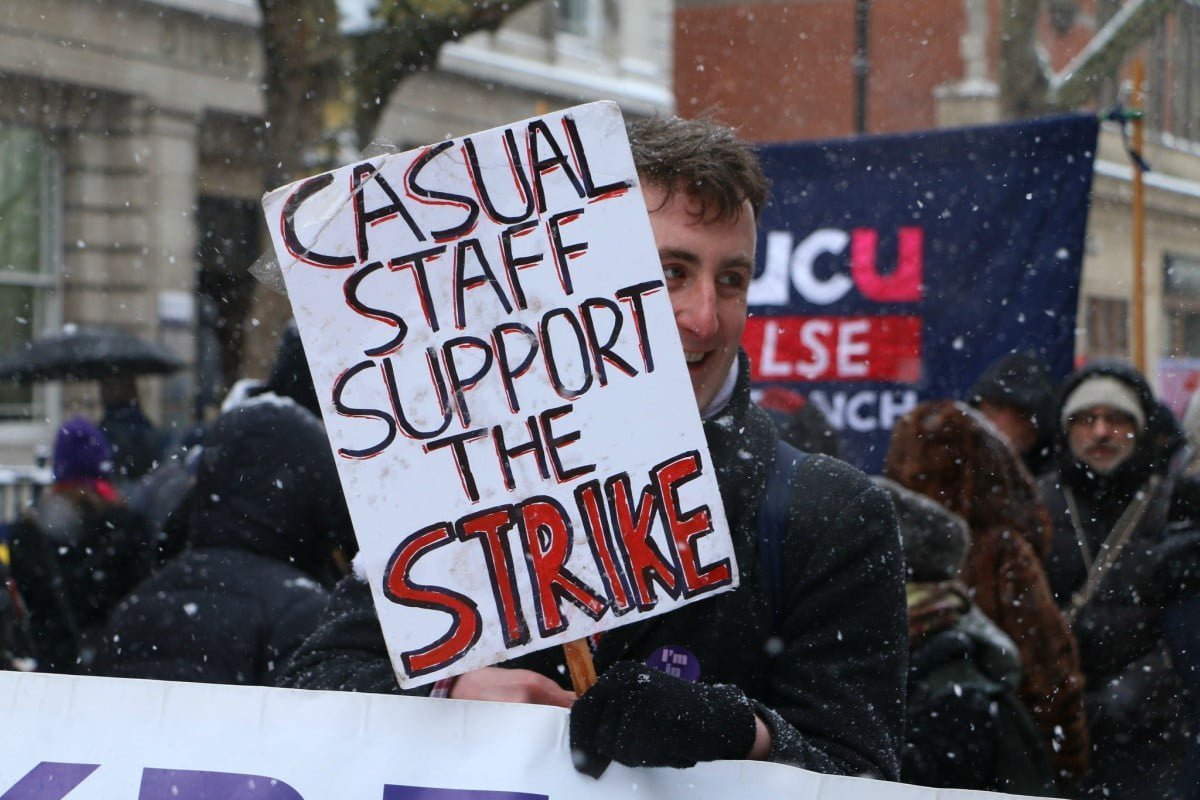 The logic of capitalism means cuts to education budgets, which in turn forces universities to increase their income if they want to survive. This requires the management to make savings, which take the form of attacks on university workers, among other things. The very university staff which are supposed to be the pillars of education institutions are transformed, under the logic of capitalism, into those whom the institution must exploit the most.
The logic of capitalism means cuts to education budgets, which in turn forces universities to increase their income if they want to survive. This requires the management to make savings, which take the form of attacks on university workers, among other things. The very university staff which are supposed to be the pillars of education institutions are transformed, under the logic of capitalism, into those whom the institution must exploit the most.
The NUS must offer financial and practical support to, and stand alongside striking university staff. The NUS needs to think big and point out that our demands for free and decent education for all can only be met by striking fatal blows against capitalism.
We argue that free education can be won and safeguarded by taking universities and other educational institutions out of the hands of private investors and capitalists, and instead run them democratically by students and staff as part of an overall plan of education, research and development in Britain and internationally.
Such a plan would serve the needs of everyone, not just those with the money. It will take a revolutionary movement involving the expropriation of the 1% to guarantee free education for all.
Save the public sector
On the basis of expropriation and workers’ control, not only could we fund free education, but we students, alongside the working class, could also rationally and democratically plan the economy. International revolution – the expropriation of the banks and placing the means of production under control of workers around the world, is the only way to escape austerity politics. It is time for a system which works for the many rather than the few.
The NHS, council housing and the welfare state too have been subject to constant attacks. The NUS must go beyond the realm of education and extend its activity into fighting for every part of the public sector. A common political programme, articulating what we’re against and what we’re for, is the way to bring all these struggles together.
At the end of the day, workers and students are all in the same boat – we’re suffering because of the logic of the capitalist system. Capitalism has led to a number of cuts across the public and private sector and collapsing living standards across the board. All those who have witnessed a stagnation or decline in their living standards should be rallied in a fight to overthrow the government.
Nationalise housing and banks
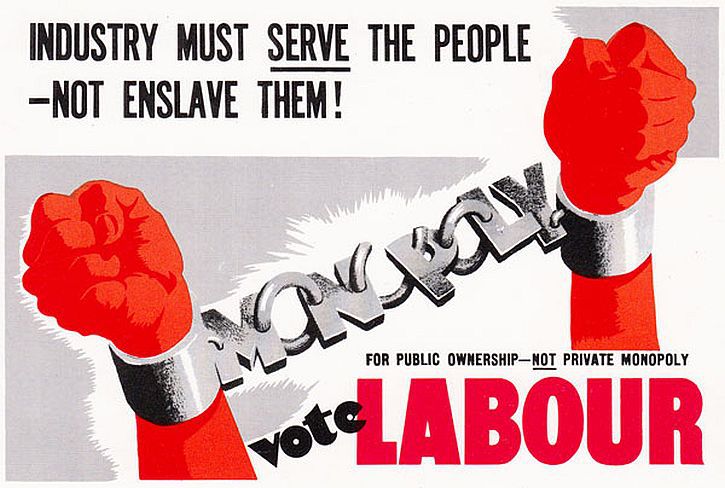 We must call for the nationalisation of banks and housing. We Marxists are committed to the nationalisation of the biggest businesses, including banks, utilities, construction companies, education services, and healthcare.
We must call for the nationalisation of banks and housing. We Marxists are committed to the nationalisation of the biggest businesses, including banks, utilities, construction companies, education services, and healthcare.
This is no longer considered an outlandish demand. In fact, support for nationalisation has risen sharply in recent years, following the failings of privatising essential services. In opinion polls, over 80% support the renationalisation of the utilities and the railways and 50% of them even support the taking over of the banks.
People are more and more attracted to the idea of nationalisation. Nationalisation is the logical answer to the failings of privatisation in every sphere, from academies to universities to the NHS.
But nationalisation is not a revolutionary measure in itself. Nationalisation alone would not result in such democratic management, because the working class does not control the state, which at present represents the interests of the ruling class, i.e. the capitalists.
However, nationalisation is a vital step towards the establishment of a planned economy, against the domination of monopolies, towards the overthrow of capitalism and implementation of socialism.
Nationalisation must go hand in hand with workers’ control. Workers must democratically plan the production and the economy on the basis of need, not profit.
These two demands — nationalisation and democratic workers’ control — are the best means to resist privatisation, outsourcing of jobs, intrusion of corporate interests on campus. This is why the NUS must launch, support and fund a campaign that would make this a reality. In order to make a real change in society.
Shakira Martin on how to achieve free education
In the list of motions and amendments to be discussed in the Education Zone, the Free Education motion was the 14th out of 16 motions and amendments. In the context of tuition fees rising to £9,250, this was surprising.
In her opening speech, the President of the NUS Shakira Martin briefly mentioned the importance of free — or at least accessible to all — education, adding that “it doesn’t matter how we get there, the point is that we get there”.
This position is deeply mistaken. It does matter how you want to achieve this goal. Although calling for free education is a progressive step for the NUS, “the way you get there”, unlike what Shakira wants us to believe, is crucial. How can you possibly intend to achieve free education without a clear plan of how to achieve it?
Furthermore, Shakira called for uniting “the left, the right, the Tories and the Trots”. However, when it comes to putting free education on the table, the way in which we fund it will be divisive. The Tories and the Trots aren’t going to agree. The key question is: who will pay for it?
Taxing the rich?
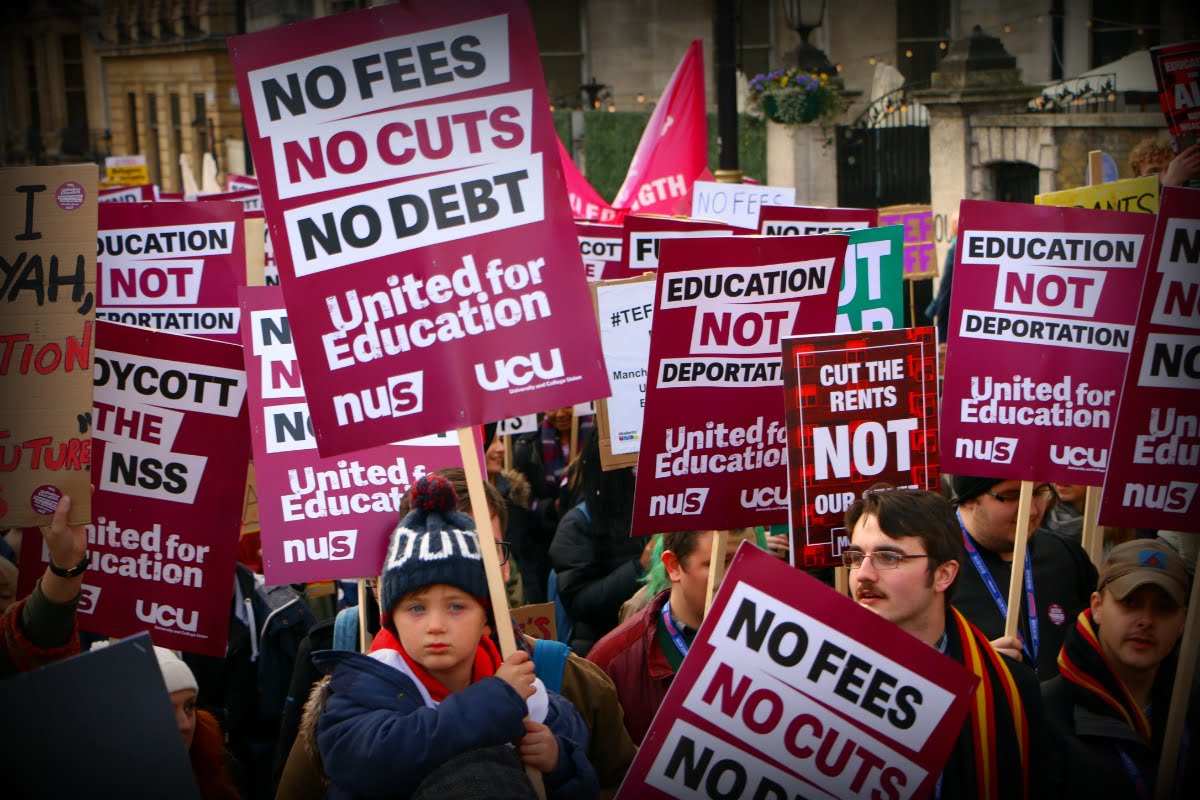 Some people call for taxing the rich in order to fund education (although the ‘left’ candidate for NUS President didn’t mention it once in her speech, nor did she mention ‘socialism’, or any other suggestion for how we can achieve free education).
Some people call for taxing the rich in order to fund education (although the ‘left’ candidate for NUS President didn’t mention it once in her speech, nor did she mention ‘socialism’, or any other suggestion for how we can achieve free education).
Restructuring the tax system so the rich pay more and ordinary people pay less seems to be a very worthy aim. We agree that the rich should pay. But we understand the limitations of such slogans as “tax the rich”.
The problem is that the rich in Britain, the capitalists, financiers and landowners, know very well how to avoid paying taxes. The TUC has calculated that the rich manage to avoid paying taxes each year to the value of up to £85 billion. Fiddling with the tax system will not make the rich pay more and the poor less. Tinkering with the tax system will not achieve the ends that the supporters of this slogan desire.
If the system for creating wealth is socially owned, then the wealth created will be owned by society as a whole. Then it will be society as a whole that will determine through its own democratic institutions how that wealth is to be distributed.
This is why we Marxists call for the expropriation of the capitalist class. We need to put the wealth of society, all the uninvested capital, the stockpiled billions, into the hands of students and workers, in order to fund education.
The biggest landlords, the banks, and the biggest businesses should be nationalised immediately and without one penny of compensation paid to the wealthy owners who have been getting rich by exploiting the rest of us for decades. This is an important point – it’s the difference between fighting for reform of a broken system, or a revolution to overthrow capitalism and to build a new society.
Any fight has to be linked with a need to restructure our economy. We stand by the position outlined by Lenin in December 1917 when he said:
“The banks, as we know, are centres of modern economic life, the principal nerve centres of the whole capitalist economic system. To talk about ‘regulating economic life’ and yet evade the question of the nationalisation of the banks means either betraying the most profound ignorance or deceiving the ‘common people’ by florid words and grandiloquent promises with the deliberate intention of not fulfilling these promises.”
The need for real change
Shakira Martin expressed numerous time her desire for “real change”. Although this desire is very welcome and supported by other delegates, this statement is unclear. Change from what to what? What kind of change?
Shakira’s slogan of change is completely empty. She claims she’s started a movement for real change, but all she’s done is investigations, reviews and lobbying the government. She hasn’t put any effort into actually and concretely solving the issues she mentions.
In fact, she’s made it clear that she’s not interested in any change taking place beyond campuses. In her speech at conference, she said: “There is evil in our world and we can’t do anything about that, but we can do something on our campuses”.
We Marxists completely reject this bureaucratic and defeatist attitude. We are aware that changing society cannot be achieved by the student movement alone, but that doesn’t mean we should write off the struggle to fundamentally transform society. Instead the NUS must develop close links with the organised labour movement and campaign for socialist policies within it. If Shakira isn’t willing to do it then she has no business being the NUS president.
Value for money
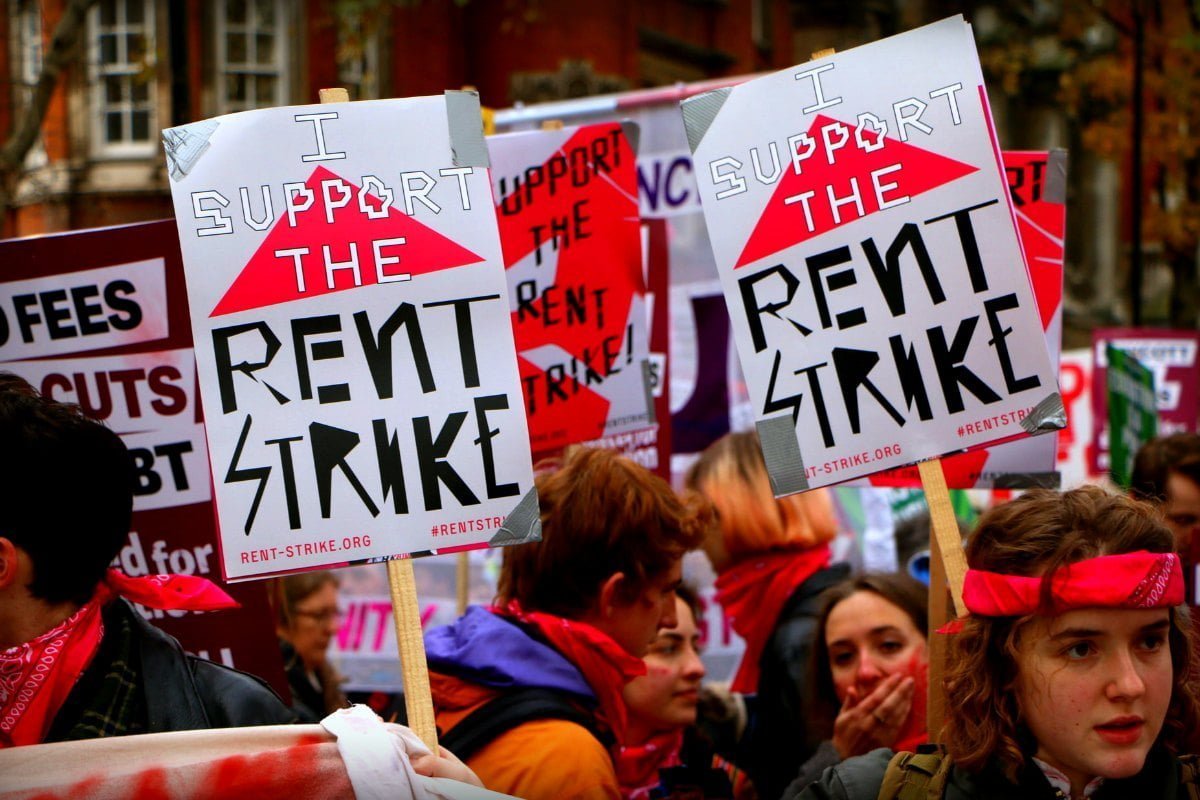 The slogan “value for money” is extremely popular at the conference. The argument goes as follows. We are paying a tremendous amount for our education: £9,250 to be exact. We are not getting an education worth the price. We should thus claim value for our money and ask for a higher quality service.
The slogan “value for money” is extremely popular at the conference. The argument goes as follows. We are paying a tremendous amount for our education: £9,250 to be exact. We are not getting an education worth the price. We should thus claim value for our money and ask for a higher quality service.
Amate Doku, the Vice-President Higher Education called in his speech and in his manifesto for “value for money”. He adds: “I think we should always get value for money that we put in the public sector”. However, at the same time, he claims to reject the “marketisation of higher education”.
There are a number of problems with his argument. First, it undermines the fight for free education. It considers education as a commercial service where the price should reflect the quality of the service. Education is a right, not a commercial service.
Furthermore, one motion called for the introduction of an “accredited, national qualification specifically for teaching in higher education”. This gives credence to the idea that education should be judged as a commodity. This will impact staff – especially staff from vulnerable backgrounds, negatively.
Second, it is contradictory. You cannot reject the marketisation of higher education while at the same time treating education as a product on the market.
It will take a revolutionary movement involving the expropriation of the 1% to guarantee free education for all. The fight against privatisation in education is a fight against capitalism. And the fight for free education is a fight for socialism.
The failure of the NUS leaders
Throughout the conference, most of the full-time officers kept highlighting the fact that things are bad, there is oppression on campuses and that students are poor. But they are not doing anything concrete to stop this. All they claim to have done are investigations, reviews and lobbying governmental institutions.
We all know things are bad, and we don’t need the NUS to spend a whole year investigating on whether we really are in a bad situation or not. We do not want abstract investigations but real programmes to tackle the issues. Instead of investigating and telling students things they are already aware of, Marxists aim to understand, explain and change things from top to bottom. We fight for socialist and revolutionary ideas.
The NUS leadership has exposed its inability to be on the side of students and tackle the issues central to their lives. Austerity measures, £9000 tuition fees, and attacks on university staff are having a huge impact on access to and quality of higher education. And yet, we have not discussed the motions on free education, fair pay and democracy in universities, and making higher education accessible to all.
What should have been done with these motions and others was to link the demand for free education to trade union and labour movement struggles that are taking place now — i.e. the UCU strike, which is an unprecedented strike in the history of British education.
Join the forces of Marxism
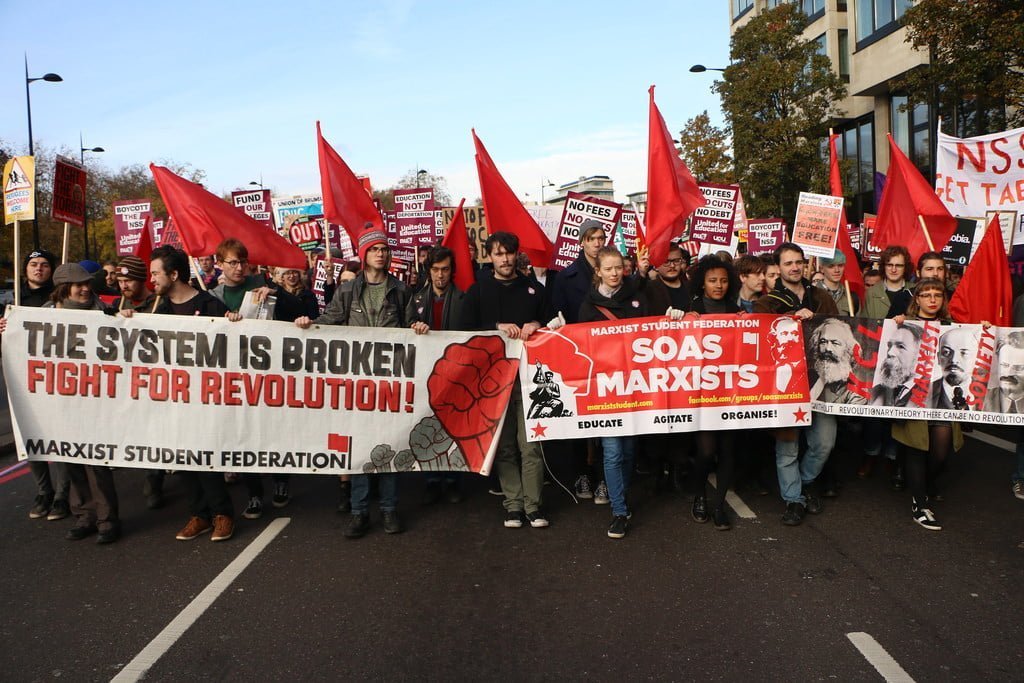 Free education cannot be achieved with eclectic and vaguely left-wing activism, and hoping for generous reforms from above. There are no ‘safe spaces’ for working class students who are starkly disadvantaged by tuition fees and the absence of grants.
Free education cannot be achieved with eclectic and vaguely left-wing activism, and hoping for generous reforms from above. There are no ‘safe spaces’ for working class students who are starkly disadvantaged by tuition fees and the absence of grants.
The NUS must aim at building support for radical ideas, not only inside its conference, but also beyond it: on campuses and further afield! Free education can only be attained by the socialist transformation of society, with universities placed under the democratic control of students, staff and lecturers.
The Marxist Student Federation, which includes 25 Marxist Societies around the country, as it grows, can play a role in turning the anger that exists in society – and especially amongst the youth and the working class – into a revolutionary movement that can transform the NUS and society as a whole.
The Marxist Student Federation has taken up the task of fighting for a genuinely radical leadership of the student movement and is linking up with the trade unions to ensure our fight can be successful. Join us if you want to take control of your own future!

